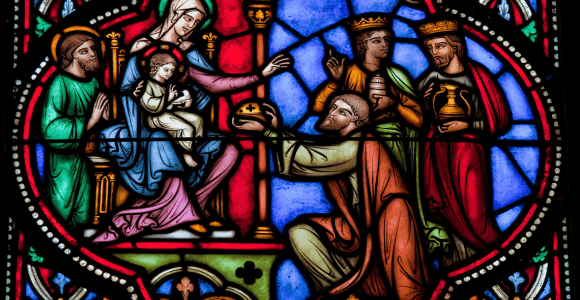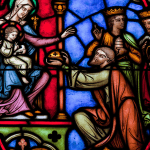
As we continue our consideration of Epiphany and Jesus’ Baptism this coming weekend, it’s helpful to note that those who follow the star in our Epiphany story are not Romans. They are Rome’s closest enemies: Persians “from the east.” Would their presence be interpreted as Herod conspiring with Rome’s enemies? What did they mean when they said “king,” and how would such talk impact Herod’s standing with Rome if it escalated and was reported back? What is the narrative purpose of Jesus being recognized by Rome’s enemies? What is the narrative purpose of baby Jesus being the victim of attempted murder by Rome’s servant Herod, who was in charge of maintaining the Pax Roman in this region?
Welcome Readers! Please subscribe to Social Jesus Here.
(Read this series from its beginning here.)
There is no stable in Bethlehem in this passage. The Magi find Mary and the baby Jesus at a house in Bethlehem.
Who were these visitors? In The Liberation of Christmas: The Infancy Narratives in Social Context, Richard Horsley explains that the Magi were the royal advisers and priests to Eastern Kings (Medes and Persians) (p. 57). This is no story of the personal piety of individual “wise men.” When we understand this story in its historical context, we can see it was filled with political tension, and the Persian characters call our attention back to another ancient liberation figure in Jewish history: Cyrus. First, here are a few verses from Isaiah 44:24-45:25 regarding Cyrus as Jerusalem’s liberator:
“This is what the LORD says—
your Redeemer, who formed you in the womb:
I am the LORD, . . .
who carries out the words of his servants
and fulfills the predictions of his messengers,
who says of Jerusalem, ‘It shall be inhabited,’
of the towns of Judah, ‘They shall be rebuilt,’
and of their ruins, ‘I will restore them,’
who says to the watery deep, ‘Be dry,
and I will dry up your streams,’
who says of Cyrus, ‘He is my shepherd
and will accomplish all that I please;
he will say of Jerusalem, “Let it be rebuilt,”
and of the temple, “Let its foundations be laid.’”
“This is what the LORD says to his anointed,
to Cyrus, whose right hand I take hold of
to subdue nations before him
and to strip kings of their armor,
to open doors before him
so that gates will not be shut:
I will go before you
and will level the mountains;
I will break down gates of bronze
and cut through bars of iron.
I will give you hidden treasures,
riches stored in secret places,
so that you may know that I am the LORD,
the God of Israel, who summons you by name.
For the sake of Jacob my servant,
of Israel my chosen,
I summon you by name
and bestow on you a title of honor, . . .
I will raise up Cyrus in my righteousness:
I will make all his ways straight.
He will rebuild my city
and set my exiles free,
but not for a price or reward,
says the LORD Almighty . . .”
What is fascinating to me is that Cyrus has his own birth narrative, too. When Cyrus was born, the Median Magi, royal advisors to Cyrus’ grandfather King Astyages, interpreted the strange dreams Astyages was having to foretell that baby Cyrus would grow up to usurp Astyages’ throne and become a great king and conqueror himself. We know today that King Astyages was the last king of the Median Empire. But at the time, feeling threatened like Herod in our story, Astyages tries to have baby Cyrus killed. The Jerusalem audience for whom Matthew was written would have understood the Persian Cyrus as more than the usurper of the Median throne. He not only became king of the Persian Empire but also liberated the Jewish people and authorized their return from the diaspora to rebuild Jerusalem (see Isaiah 44 and 45 above.)
Here in Matthew, then, as with baby Cyrus of old, Magi from the East show up to recognize Jesus and proclaiming that this baby boy will grow up to be “king” and liberator too.
All of these political details speak of the liberation hopes of the marginalized living under Roman oppression for whom the Gospel of Matthew was written. With the Matthean star, Jesus was to be placed on the same playing field as the Caesars. Through the presence of the Magi, Jesus was to be interpreted as a second Cyrus and a conduit of liberation for the oppressed. And just as Cyrus was a threat to Astyages long ago, Jesus now would be interpreted as a threat to the powerful, privileged, and propertied (including Herod and Herod’s household), a usurper of the status quo, with liberation effects rippling all the way back to Rome.
The entire Epiphany narrative in Matthew speaks of liberation and justice for those pushed to the undersides and edges of their society. It calls us to work alongside those same communities today and to work for change, for justice, for a world that is a safe, compassionate, and inclusive home for all.
(Read Part 3)













